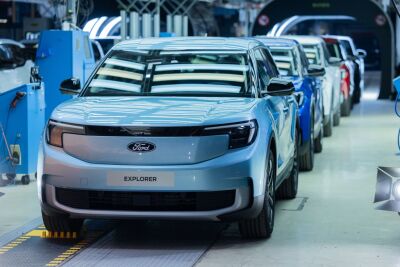First strike at Ford plants in Cologne


A strike is taking place for the first time at the almost 100-year-old Ford plant in Cologne. The protest against planned job cuts at the site, which employs 11,500 people, is scheduled to begin Wednesday morning and last until the end of the night shift on Thursday morning, according to IG Metall.
Management plans to eliminate 2,900 jobs by the end of 2027 to reduce costs. The union is up in arms against this. It accuses the company's leadership of a lack of planning that jeopardizes the continued existence of Ford's long-established German subsidiary. IG Metall is advocating for a social collective agreement that provides for high severance payments and financial security for the workforce.
Ballot results in high approval
There had already been warning strikes in March and April, but negotiations subsequently stalled. As a result, IG Metall held its first ballot at Ford plants last week. In the survey, 93.5 percent of IG Metall members working at Ford declared themselves willing to strike to increase pressure on management and enforce their demands. "It's time for the employer to move and find a comprehensive solution for the workforce in Cologne," said Benjamin Gruschka, head of the works council at Ford Germany.
The German management of Ford-Werke GmbH has limited influence, as the company is ultimately dependent on its US parent company. The parent company recently canceled a type of guarantee, thereby increasing the pressure on the German subsidiary.
Car business is a problem child for US parent company
The US company Ford is a strong player in the pickup truck and commercial vehicle business, such as the Transit van. However, the European-focused car business is merely a subsidiary of the US manufacturer, which has long been making losses. While the Cologne-based Ford Fiesta subcompact was a sales success for decades, the tide gradually turned. Production of the car was discontinued in 2023.
The company currently produces two electric cars in Cologne, but sales fell significantly short of expectations. Investments of almost two billion euros in the new electric car production have not yet paid off. According to official figures, Ford's share of newly registered cars in Germany was only 3.5 percent in 2024, 1.5 percentage points lower than in 2022. Although the Ford plants are receiving several hundred million euros from their US parent company for further investments over a period of four years, industry experts believe this is far too little.
Of the 11,500 Ford employees in Cologne, approximately 4,500 work in production and 3,500 in product development, according to union figures. Approximately 1,700 people work in a spare parts center. In addition, there are administration and other departments.
In recent months, parts of the production facility had been temporarily subject to short-time work; this phase ended at the end of May. The impact of the strikes on Ford's Cologne plants is likely to be severe, as the vast majority of employees are union members and there is considerable discontent among the workforce about the current situation.
Experts are skeptical
According to industry experts, Ford's future with its passenger car business in Europe is bleak. "The situation is bad, and the outlook is even worse," says Ferdinand Dudenhöffer, director of the Bochum-based automotive institute CAR. "Ford is too small in the passenger car sector to be able to operate profitably in Europe – that's the case now and it will most likely remain so in the future." Unit sales are too low, and personnel costs are too high. Ford has been losing market share in Germany and Europe for a long time. "Ford keeps shrinking."
There are two solutions, says Dudenhöffer: The US parent company could sell its European car business. "Then the problem would be solved." Car production could remain in Cologne, but the development department and administrative areas would move to the buyer's headquarters. The second solution would be to establish a joint venture with another car manufacturer, thereby achieving higher production volumes and lower costs. "Then perhaps we'll finally become competitive," says Dudenhöffer. One possible partner would be Renault.
Stefan Bratzel, director of the Center of Automotive Management, sees a third path. "The US parent company would have to invest billions in the development and production of new electric cars and in enhancing its brand image." Ford headquarters in the US would have to demonstrate a level of determination that it has lacked in recent years.
For its two electric car models in Cologne, Ford buys key components from Volkswagen. "This means the added value for Ford is low, which makes the business less attractive," says Bratzel. Ford was too late to embrace e-mobility and then only half-heartedly. The outlook for Ford in Europe is also poor because competition in Europe will only increase – Chinese suppliers are entering the market.
APA/dpa
energynewsmagazine


